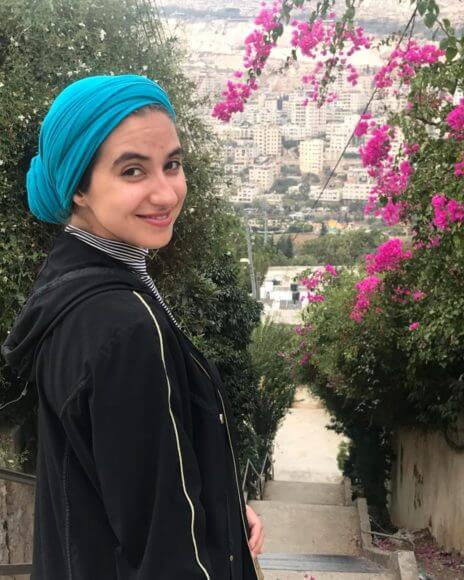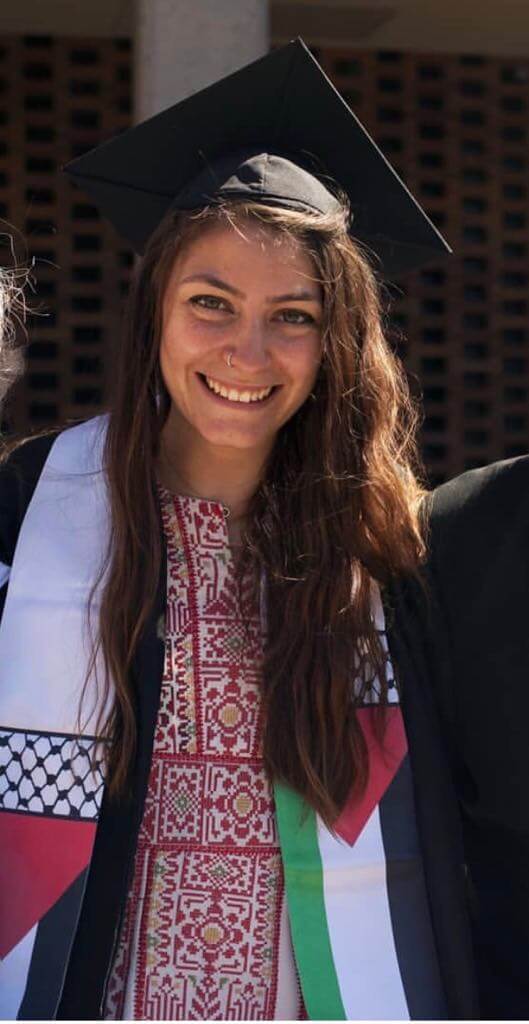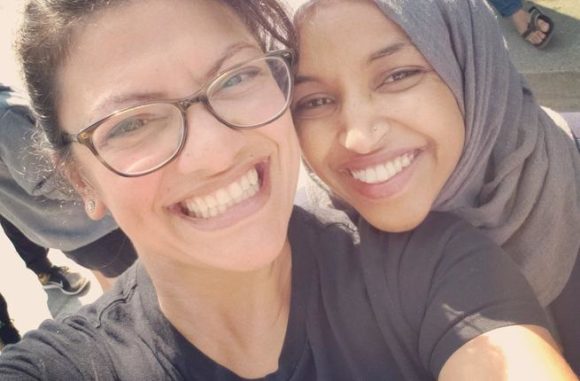As the polls came to a close and the midterm results began rolling in this November, Palestinians at home and across the diaspora celebrated the election of one of their own, Democrat Rashida Tlaib of Michigan’s 13th Congressional District.
Tlaib made headlines across the US and the world as one of the first Muslim-American women to be elected to Congress, and the first ever Palestinian-American woman to do so.
After a year of relentless foreign policy and financial blows to their cause, Palestinians finally had something to celebrate.
In Palestine, Tlaib’s win was a form of poetic justice: the descendant of Palestinians from a small occupied West Bank village would now be serving in one of the highest levels of US government.
In the US, however, Tlaib’s win meant so much more. For Palestinian Americans, specifically women, Tlaib means representation in a predominantly white male government, and an opportunity to shift the narrative on their homeland.
Mondoweiss spoke to young Palestinian American women from across the country on what Rashida Tlaib’s win means to them, their hopes for her in congress, and the lasting impact of her election.
‘Representation matters’
When 22-year-old Jannah Fakhouri, a resident of Tlaib’s home state of Michigan, got news of the congresswoman elects win, she was overwhelmed with a sense of pride.
“It made me feel like there was hope in America,” Fakhouri told Mondoweiss.

“Despite all of the rampant bigotry and racism, despite the movement of the US Embassy to Jerusalem amidst global outrage, despite our faulty foreign policy as Americans, we still united and voted in a woman who is unapologetically Palestinian and also, Muslim,” she said.
For Fakhouri and other young women like her, who have faced discrimination for the way they look, Tlaib’s presence in the halls of Congress offers a historically marginalized group such as Palestinian women a shot at having their voices heard.
“I think it is vital now, more than ever, in light of Islamophobia and bigotry towards people of Middle Eastern origin, that our narratives are being shared, that our voices are being heard and that we are seen,” Fakhouri continued, “not as ‘the other’, but as an active political and social force within American communities.”
“It is only through representation that we will begin to see change,” she said.
Alia Taqieddin, 23, a Legal Advocate at Northwest Immigrant Rights Project and Palestinian activists, told Mondoweiss that she believes representation matters, “as long as it is authentic representation.”
“She represents Palestinians in the political arena, but she is representing us in a system that is fundamentally broken,” Taqieddin said.

“I want to be represented by a Palestinian-American woman who is not afraid to name Israel as an apartheid state. I want to be represented by a Palestinian American woman who reaches out to radical youth, like the Palestinian Youth Movement or the National Students for Justice in Palestine, to represent our calls for justice,” she continued.
Taqieddin criticized Tlaib’s previous use of language that normalizes the Israeli occupation, citing an August interview with Democracy Now in which Tlaib said: “I’m going to humanize this issue, and I’m not going to choose sides… I am for everyone, every single person, Israeli, Palestinian, to have equal access to opportunities, to feel safe where they live, and to really be a genuine partner and a visionary around reaching peace in that region.”
“That kind of language scares me,” Taqieddin said.
Some critics believe that Tlaib toned down her rhetoric on Palestine and issues like BDS leading up to the election in an effort not to hurt her campaign.
Since November 7th, she has come out in defense of fellow Muslim Congresswoman-elect Ilhan Omar’s support of the BDS movement, tweeting a photo of herself as a child along with her grandmother:
My parents were both born in Palestine (Falastine). My sity still lives there. So when my sister @IlhanMN is being attacked for supporting the #BDS movement (protected freedom of speech!) we can't stay silent. Nothing is more American than the fight for justice at home & abroad. pic.twitter.com/rNhCQ77fLg
— Rashida Tlaib (@RashidaTlaib) November 16, 2018
Tlaib has also vocalized her support for the so-called “one-state solution,” an increasingly popular position among Palestinian youth who no longer see the two-state solution as viable under the political climate in the occupied territories.
While she doesn’t believe Tlaib can single handedly give a platform to the Palestinian civil society’s call for BDS, Taqieddin hopes that the congresswoman-elect along with other progressive candidates “can collectively block the steady stream of fascist policies and bills that have been emerging from the current administration.”
Cautious optimism
While there is certainly a sense of excitement that comes along with having a Palestinian American woman elected to congress, the women Mondoweiss spoke to all expressed feelings of being cautiously optimistic when reacting to Tlaib’s election.
Twenty-two year-old Yasmin Mjalli, a graduate student at Duke University and the founder of BabyFist, a feminist clothing company “designed to start a conversation about Women’s Rights” in Palestine, told Mondoweiss that while she is “incredibly proud of Rashida,” she is “erring on the side of caution.”
“She’s greatly outnumbered by Zionist politicians, not to mention Islamophobic and misogynistic politicians,” Mjalli remarked.

“That being said, no one who ever changed history was really part of the majority,” she continued. “Having a diverse representation presents various narratives, some of which can hopefully challenge dangerous voices which have historically gone unchallenged in Congress.”
“I want to see Congress finally see and defend the reality of the Palestinian struggle,” Mjalli said, adding that she hopes Tlaib’s presence in Congress could help contribute to that shifting narrative.
As she spoke to Mondoweiss, Fakhouri expressed similar doubts as to what tangible changes Tlaib and other candidates like her may be able to bring about.
“I genuinely do not know what power Rashida may hold or what sway she may have, now that she has been appointed,” Fakhouri said.
“But I do hope that she can be a herald for true equality and understanding within America, especially for minorities,” she said, adding that she hopes Tlaib will “stand for less invasive US involvement in the Middle East, particularly in regards to the zealous support of Israel, against the occupied Palestinian people.”
As for Taqieddin, things are already off to a less than promising start.
“I truly hope that they will stay strong in their convictions,” she said, speaking of Tlaib, Omar, and other progressive candidates like Alexandria Ocasio- Cortez.
“We’ve already seen the progressive Democrats’ original platform on ICE shift from abolishment to reform, which is disheartening to say the least,” she said.
‘What comes next?’
“My immediate reaction when I saw that Rashida had won was ‘okay, what comes next?’,” Taqieddin, the co-founder of Students United for Palestinian Equal Rights at Western Washington University, told Mondoweiss.
For activists like her, Taqieddin says, the political motions that will be taken by Tlaib and other progressive candidates throughout their terms can only succeed when they work hand in with grassroots activism.
“A lot of the work that needs to be done, and is actively being done, must happen outside of the political arena, Taqieddin said, pointing to the necessity of building solidarity across movements.
In Taqieddin’s eyes, the struggle for justice in Palestine, Black Lives Matter, and the fight against Trump’s anti-immigration policies are all one and the same.
“Right now we’re reading about Trump’s complete militarization of the U.S./Mexico border against asylum seekers from Central and South America, and there are hundreds of images circulating where you can barely distinguish Ferguson, from Tijuana, and from Gaza,” she said.
“Actively and vocally supporting Queer and Trans rights is also urgent,” she added.
“Rashida Tlaib’s election is one part of a much bigger movement.”



Sadly, Trump is putting the final nail in the coffin created by the vicious zionists.
“We must use terror, assassination, intimidation, land confiscation, and the cutting of all social services to rid the Galilee of its Arab population.”
https://www.juancole.com/2018/11/palestinians-ending-support.html
“Chairman Heilbrun”. No such person, no such quote.”
who was the Chairman of the committee for the re-election of Schlomo Lahat in 1983?
“: I was never a supporter of Menahem Begin, but in fairness, he never referred to the Palestinians as “two legged beasts”
Is Camera (https://www.camera.org/article/exposing-false-zionist-quotes-ii-quote-busters-ii/)
really a source dear to the heart of a non-lieing professional historian Zionist pioneer, irrespective of what you do or do not support Zionism is replete with all the crimes and disgusting attitudes of Western Settler colonialism, and it is not really Hamas’ fault now is it Jon, it was all an accident? even failing to allow the expelled to return? acknowledging the massacres? and you promised to be truthful, nothing a Zionist says can be trusted.
Another excellent article by Yumna Patel. i had never heard of any of these young women you interviewed either. i was so impressed with what Alia Taqieddin said i googled her and watched her give the commencement speech at her university. https://vimeo.com/275919429
she’s got a promising future., they all do. it gives me hope.
as your basic caucasian fifty year old jewish american it excites me too…not much else about Congress is very interesting and this is, I can ask my reps whether they might consider what this person thinks, as they are part o the caucus now. It helps when I call and tell them about reality. It’ll help humans like Senator Warren identify and we can use it to explain that the earth is only half flat to senator markey. Those two pretend they care, but only on TV and in the movies is it true.
Eljay: About Palestinians not using Israeli pools.This mayor said Palestinians “don’t have the same hygiene.” I entirely agree. Most Israelis, being of European descent, merely wipe themselves after potty. Palestinians wash themselves. So who has the better hygiene?